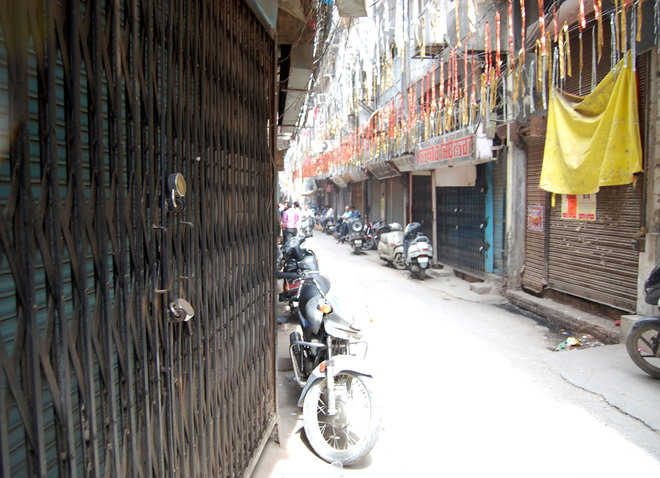Neeraj Bagga
Tribune News Service
Amritsar, April 2
The narrow lanes of the historic Guru Bazaar here have been lying deserted for the past over a month due to a strike call given by the gold and diamond jewellers while the trade is suffering.
Situated in the periphery of the Golden Temple, the Guru Bazaar area is also visited by tourists. Consequently, tourists are deprived of a peep into the old-world charm of the walled city.
Around Harmandir Sahib are narrow winding alleys and streets of the old city, dotted by shops selling jewellery. Some of the buildings look old and are beautiful with their trellised wooden and metal balconies.
The Guru Bazaar markets of gold and silver cater to almost the entire north India. Each shop in the market is like a storehouse of a variety of gold ornaments. A shop here could be a big showroom or a small box-like place in a corner.
A remarkable feature about Guru Bazaar is that the upper storey of the buildings, which look like houses from outside, are in fact a large wholesale and production market of gold and diamond ornaments.
The Bengali and Maharashtrian craftsmen have replaced the Punjabi craftsmen. Migrant artisans mastered the art of engraving on metal. Here they create exquisitely engraved brassware articles like lamps, boxes, bowls, picture frames and planters. Ancient art and modern aesthetics mingle well at the roadside silversmith in Amritsar. Now, the machine-made jewellery has dominated handcrafted items.
In the city, nose pins are made with a high degree of craftsmanship and the buyers for them range from Kashmir valley to Kanyakumari and Gujarat to West Bengal.
The Sikh holy city is a leader in manufacturing ‘bandel’ (a nose pin made of copper and covered with gold foil) in the country. These nose pins are sold off in UP, Bihar, Jharkhand, Madhya Pradesh, Chhattisgarh and other parts of the country. Amritsar has a monopoly in the manufacturing of ‘bandel’.
Apart from gold nose pins and ‘bandel’, artificial nose pins with gold polish are the cheapest available nose pins. The diamond-studded nose pin is the costliest in the market.
Amritsar’s nose pins are way ahead of any other city involved in their production, even in the country’s tribal areas.
The reason for Amritsar’s monopoly over manufacturing of nose pins across the nation is mass-scale production. Thousands of shops, and even entire families, are involved in making nose pins. Many localities in the Sultanwind area are involved in their production.
Unlock Exclusive Insights with The Tribune Premium
Take your experience further with Premium access.
Thought-provoking Opinions, Expert Analysis, In-depth Insights and other Member Only Benefits
Already a Member? Sign In Now










